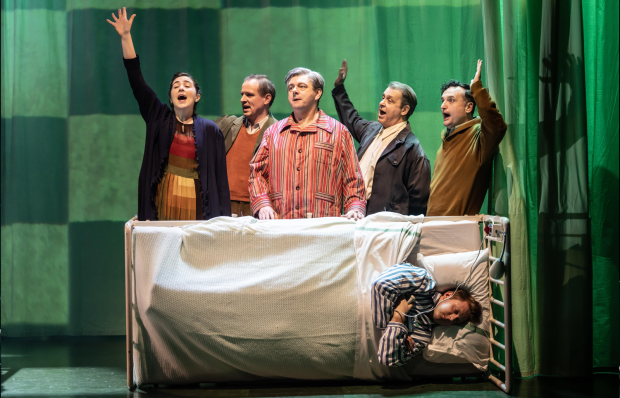Sea Wall, by Simon Stephens, is a half-hour monologue about grief performed by Andrew Scott. The YouTube clip has been viewed more than 250,000 times. The habitual quirks and irritants of Stephens’s writing are all here: the inept jokes, the laddish swearing, the fascination with 1970s pop, the preference for males over females and the improbable back stories of the characters.
The narrator is an Irish cameraman who earns money photographing ‘cushions and digital alarm clocks’ for shopping catalogues. He tells us a bit about his wife and daughter (‘she was a Caesarean’), but he’s far more interested in his father-in-law, Arthur, a scuba-diving maths teacher who retired from the British army with the rank of lieutenant-colonel. Arthur lives in the south of France where the family spend their summer holidays. ‘We watched an unusual amount of tennis together.’ The narrator remembers how his daughter screamed ‘like the living shit’ when she first encountered Arthur but later she came to relish his company. He imagines his baby’s thoughts as she raises her arms for attention. ‘Put me in your lap, put me in your story, now! You funny old fucker.’
During a philosophical debate the narrator asks Arthur if he thinks God might look like Gary Glitter. ‘He tells me not to be so bloody stupid.’ The script trickles along like this for 15 or so minutes but an unbearable calamity is about to strike. This is signalled, over-emphatically, on the eve of the annual holiday, when the narrator’s wife shows him her new backless dress. ‘I swear for about 30 seconds I couldn’t speak. And the idea that I was married to her. And we had our girl. And that this was our life!’ Clearly the fates can’t endure this level of happiness for long. The next day, while paddling across the bay, he notices that ‘the sky is this huge blue curve’. Then the terrible event occurs.
At which point something marvellous happens to the writing. It purifies itself, and rises to unexpected heights of insight and observation. Gone are the swearing, the jokes and the miscellaneous irrelevances. The narrator explains to us the texture and density of grief in its raw, new-born form. He recalls carrying the corpse. ‘This bit of meat, this bit of meat and air.’ Back in England, he finds gruesome surprises everywhere. ‘There’s a hole running through the centre of my stomach.’ The sight of a married couple bickering in the street makes him distressed and furious. He senses the approach of a nervous collapse. ‘If this can happen anything can happen.’ He can’t weep and yet he can’t explain the dryness of his eyes. ‘I’m holding my entire head together, the skin and the shell of me, but I’m falling absolutely inside myself.’ On the page that line may appear Gothic and overwrought but Andrew Scott gives it a horrible naturalism and truth. His acting here is amazingly easy and unforced. If you didn’t know he was a performer you might assume you’d stumbled on a video blog by an anguished parent. Those affected by a similar tragedy may find this too awful to watch. That’s how good it is. Avoiding it might be the wisest course.
No one knows what was wrong with Shakespeare when he wrote The Winter’s Tale. His decision to call it ‘The Winter’s Tale’ (which doesn’t exactly scream ‘box office’) is a sign that his faculties were slipping. The play straddles two incompatible genres. It opens as a psychological thriller in a royal palace. The second half is a bucolic romp with winsome shepherdesses and ‘amusing’ pickpocket characters.
It starts with Leontes, king of Sicily, accusing his wife of adultery and throwing her in jail. Their baby daughter is banished. Some have seen parallels here with Henry VIII’s treatment of Anne Boleyn. Later, the king learns that his wife was entirely innocent and he’s rewarded for his cruelty with a miraculous visitation. She comes back to life from a statue dedicated to her memory. They continue their marriage as if nothing much had happened. Even better, Leontes finds that the missus hasn’t aged at all in the 16 years since he had her slung in jail. Is this the most sexist play ever written? Will Keen nicely captures Leontes’s quivering, nervy anger. Hermione is played by the excellent Priyanga Burford who can’t do much with this feeble sketch of bovine saintliness.
Sirine Saba, a fabulous Paulina, plays the role as a booming ball of energy. Hers is the true voice of defiance and justice in this play. When Leontes threatens to burn her she delivers one of literature’s great put-downs. ‘It is an heretic that makes the fire,/ Not she which burns in’t.’ Saba has been cast as Charmian at the Globe. She deserves to play Cleopatra./>
Got something to add? Join the discussion and comment below.
Get 10 issues for just $10
Subscribe to The Spectator Australia today for the next 10 magazine issues, plus full online access, for just $10.
You might disagree with half of it, but you’ll enjoy reading all of it. Try your first month for free, then just $2 a week for the remainder of your first year.














Comments
Don't miss out
Join the conversation with other Spectator Australia readers. Subscribe to leave a comment.
SUBSCRIBEAlready a subscriber? Log in